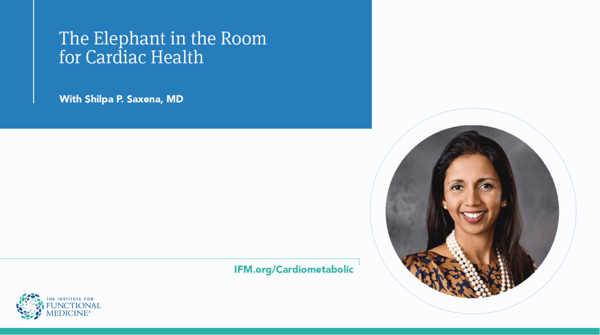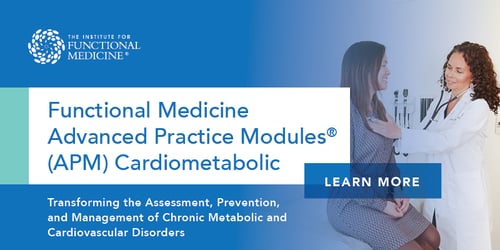This conference will help clinicians understand the physiology underlying cardiometabolic syndrome and cardiovascular disease, new approaches to effective assessments and treatments, and how to integrate these lifesaving tools into practice.
+ What you will learn at the Cardiometabolic conference
- Utilize the Functional Medicine Matrix model to develop an effective systems biology organization when taking a cardiovascular medical history.
- Evaluate the evidence demonstrating the primary mechanisms underlying the relationship between endothelial dysfunction and the progressive development of atherosclerosis.
- Identify the relationships between chronic stress and the development of dyslipidemias, hypertension, weight gain, and metabolic syndrome.
- Evaluate and utilize new assessment approaches for identifying chronic inflammation, oxidative stress, autoimmunity, toxicity, and hormonal dysregulation in patients with cardiometabolic dysfunction.
- Analyze the most practical and useful laboratory assessments and biomarkers necessary to evaluate cardiovascular risks and recognize functional patterns associated with metabolic disease.
- Evaluate and utilize specific nutrients, phytonutrients, botanicals, pharmaceuticals, dietary plans, stress reduction techniques, and lifestyle interventions to improve the prevention and management of patients with hypertension, cardiovascular disease, metabolic syndrome and type 2 diabetes.
+ Exhibit & Sponsorship Opportunities
We’re thrilled to offer you a chance to engage with a global community of practitioners dedicated to advancing evidence-based functional medicine. By sponsoring a Core Program, you’ll have prime visibility to showcase your brand, products, and services while building meaningful connections with a diverse and influential audience.
Fill out the form below, and a member of our team will connect with you to provide detailed information on sponsorship opportunities, helping you discover how your brand can make a lasting impact at an IFM Core Program.
Chronic Metabolic and Cardiovascular Disorders: Insights and Education
Transforming the Assessment, Prevention, and Management of Chronic Metabolic and Cardiovascular Disorders
Over the last 10 years, researchers have discovered that controlling heart disease is not merely a matter of driving serum cholesterol down; 50% of people who have a heart attack have normal cholesterol levels1. Why is this problematic? It means that for at least one out of every two patients having a heart attack, a clinician may not have addressed the risk factors that caused their heart attack. Research is shedding light on safer and more effective strategies of identifying important risk factors for preventing or reversing cardiometabolic disease, including advanced lipid assays and markers of oxidative stress, inflammation, hormone levels, and comprehensive body composition analysis.
In this video, IFM educator Shilpa P. Saxena, MD, explains that insulin is a driving force that creates a cardiometabolic state that includes inflammation and adiposity.

- Sachdeva A, Cannon CP, Deedwania PC, Labresh KA, Smith SC Jr, Dai D, Hernandez A, Fonarow GC. Lipid levels in patients hospitalized with coronary artery disease: an analysis of 136,905 hospitalizations in Get With The Guidelines. Am Heart J. 2009 Jan;157(1):111-117.e2. doi: 10.1016/j.ahj.2008.08.010. Epub 2008 Oct 22. PMID: 19081406.
Cardiometabolic Related Articles
Who is AFMCP designed for?
IFM encourages a multidisciplinary approach to patient care. We welcome a variety of licensed healthcare disciplines to AFMCP, including MDs, DOs, NDs, DCs, physician assistants, nursing professionals, and nutrition professionals.
Can I take another course before taking AFMCP?
Many learners find taking AFMCP first helps them to understand IFM’s proprietary tools, such as the Functional Medicine Matrix, and provides context for the skills, processes, and science behind incorporating Functional Medicine principles into practice. The course is offered multiple times each year in order to meet the needs of clinicians wishing to begin their IFM education with AFMCP. However, AFMCP is not a prerequisite to take any IFM course if you are comfortable with the material to be presented.
Will I be certified as a Functional Medicine practitioner after attending AFMCP?
No. AFMCP is one of seven required courses in the IFM Certification Program. In addition to AFMCP, you must complete the six Advanced Practice Modules as required coursework for the IFM Certification Program.
Will I be listed on the Find A Practitioner search after I attend AFMCP?
After attending AFMCP, you will be eligible to list your profile in our Find A Practitioner search as long as you are also enrolled in the IFM Membership Program. Before your profile is listed, however, you must fill in your practice information within your account profile to activate your profile to appear in the search.

Reducing CVD Risk Factors

Probiotics & NAFLD/NASH

Metabolic Effects of COVID

Nutrients for the Heart

Cardiometabolic Health

Cardiometabolic Food Plan
Support heart health and blood sugar balance with IFM’s Cardiometabolic Food Plan.

Learn About IFM's Cardiometabolic Experts
Attendee Testimonials
The content about lipid management was top priority for me, and I feel like this was covered very well during the conference. This conference was more than just head knowledge, which also set it apart. There was a unique heart engagement that was motivating and inspirational.
Cardiometabolic APM Attendee
This was the first review of cardiometabolic long term effects of COVID which I found very helpful, considering we are seeing more and more patients with post-acute COVID palpitations/ shortness of breath that are s/t dysautonomia.
Cardiometabolic APM Attendee
The knowledgeable, passionate speakers were delightful to listen too. Not only did I learn, but they felt like friends by the end of the conference.
Cardiometabolic APM Attendee
I would recommend this course to cardiologists and physicians who just wanted to take one FM course as an introduction to FM - I think just this course alone could drastically impact the way they treat patients. A lot of clinical pearls for treatment of cardiometabolic disorders that are not medication related.
Cardiometabolic APM Attendee
Your team worked tirelessly throughout the entire weekend leading the discussions, sharing personal stories, clinical insights, and wisdom. What an incredible gift, thank you all so much and thanks to IFM for producing great content, toolkits, and info backed by research.
Cardiometabolic APM Attendee

Join Functional Medicine Newsletter
IFM's bi-monthly newsletter provides clinical commentary, insights, and research on what's new in the field of functional medicine. Want the latest content delivered directly to your inbox? Subscribe to our newsletter to stay connected with us.**By submitting the form below, you indicate that you have read and agree to IFM’s privacy policy. We promise to treat your data with respect. If your interests change in the future, you can update your preferences or unsubscribe from emails at any time using the link provided at the bottom of each email.








